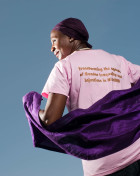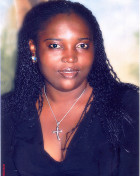I currently live in Abuja, Nigeria where I am an independent researcher working on issues of sexuality and women’s empowerment, feminist thought and practice, and women’s relations to the state. As Co-ordinator of the Initiative for Women’s Studies in Nigeria (IWSN), I’ve raised funds for and overseen action research on the politics of sexual harassment and sexual violence in six Nigerian universities, and on women’s experiences of citizenship. I have been involved in activism around the constitutional reform process, affirmative action for women in politics, and challenging inequitable laws such as the Public Nudity Bill. I chaired the Legislative Advocacy Coalition on Violence Against Women (LACVAW), at the time it formulated a federal law on this matter, and am engaged with the coalition’s push for its enactment.
I call myself a feminist because I work towards a world where women are liberated from misogyny, exploitation and subordination and where men are liberated from the desire to dominate women. What drives me is a sense of profound injustice at the conditions in which so many women live their lives, whether their oppression is on the basis of the economic circumstances they find themselves in, the religion they practice voluntarily or otherwise, who they choose to love and so on. This has to change, and in order to do so, one needs a critical analysis and an organised movement to challenge the power relations that uphold such inequity.
I believe that African feminists face contemporary contexts marked by rapid social and economic change and the rise of identity politics in the wake of imperialism and militarism. The violence that this spawns, particularly against women, is unacceptable, whether in conflict situations or peacetime. Women’s bodies, and especially their sexualities, become the targets of reactionary moves to impose ‘order’. Some of our main challenges include finding appropriate intellectual frameworks to understand these changes and to organise effectively against them, given our small numbers and relatively limited reach. I think we can address this by strengthening the feminist movement through face-to-face meetings, like the national and continental feminist forums, to facilitate debate, the sharing of experience and a sense of being strengthened by our diversity, in the pursuit of shared goals. I think intergenerational exchanges are very important - a two-way exchange between the more experienced among us and those newer to feminist struggles. Better funding and institutional support for women’s organisations would go a long way to making our work more effective.
In my professional life, I’ve tried to address some of these challenges through the kinds of research I do and my efforts to strengthen capacity for teaching and research in gender and women’s studies. In my personal life, I strive to be (not always very successfully) the kind of person that I envisage inhabiting a feminist society – one who can exercise her critical faculties without losing a sense of openness to the emotional in oneself and other people or the absurdity in life(!).
I am inspired by the indomitability of the human spirit when I read the life stories of women who have overcome huge obstacles in their lives. I am invigorated by the use of the imagination in explorations of psychic and emotional life in literature. Beautiful things like flowers in the garden, hummingbirds, music - all contribute to enriching my life and the lives of those around me. Finally, I marvel at my children, the questions they ask, their perspectives on life and the ways in which each, in their different ways, is more able to be true to him/herself than I ever was at that age.




